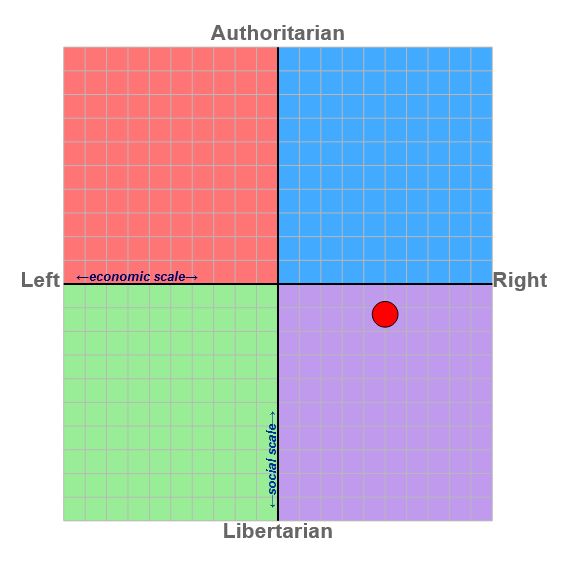Given the observation that all Internet surveys on the topics of politics and economics will inevitably prove that you’re a libertarian, I nevertheless took this test:

My problem with these kinds of surveys is that questions are often posed demanding an either/or response, or else the question steers you towards a choice that isn’t really a choice
Here’s one example, in fact the very first question:
If economic globalisation is inevitable, it should primarily serve humanity rather than the interests of trans-national corporations.
If economic globalization occurs, it will largely be brought about by government and transnational corporations. Expecting either to protect or enhance the interests of “humanity” is naïve beyond belief, because globalization is sought either for control (government) or profit (corporations). You can’t actually answer that question inside an Agree / Disagree matrix. But because the role of governments is ignored in the question, you’re forced into supporting transnational corporations or opposing them — a false dichotomy because in some cases, a uniform model is good (banking) or terrible (gun control). (I know: gun control isn’t an economic issue, unless one ignores H.L. Menken’s observation that when politicians talk, regardless of topic, it’s always about money.)
Here’s another:
Our race has many superior qualities, compared with other races.
Define “race”. Are we using the classical definitions (e.g. Western-European, Sino-Japanese, Middle-Eastern) or the modern one (Black / White / Yellow / Other)? The White “race” is superior to the Black race when it comes to things like fine art, architecture or the rule of law, but are those even “qualities”? Once again, the survey-taker is left to decide what we’re talking about here, but in this case you can’t combine disparate definitions and opinions when using vague terminology.
One more example:
Controlling inflation is more important than controlling unemployment.
Those are incomparable conditions, because neither is a cause or a consequence, nor are they relatable. And “more important” to whom, exactly?
Having worked in the research business for over a quarter-century, I’ve designed literally hundreds of surveys, and found the “agree/disagree” format to be profoundly inferior to discrete / conjoint analysis — the latter involving a set of choices on the same topic, e.g.
Which do you prefer:
Option A or Option B?
Option B or Option C?
Option A or Option C?
The problem with conjoint methodology is that it’s more difficult to set up and to analyze, so lazy researchers (i.e. most of them) tend to go with the simpler binary structure.
Life, unfortunately, is seldom binary (unless you are a computer, totalitarian, religious zealot, libertarian or idiot — some overlap). The real world is more complex than that, which is why setting economics and social issues on a simple XY axis will almost always lead you to discover that Aha! you too are a libertarian, or would be if you could.
In fact, I have found that I tend more to the authoritarian side of the scale because I have to acknowledge that some form of outside control is sometimes necessary — protection of private property and streetlights being the simplest ones to imagine — but it can equally be deplorable (e.g. Judenfrei Nazi Art).
Nuance: we all have it, in varying degrees, except to most survey-takers.
Please note that I’ve erred on the side of simplicity in the above, because nothing causes a MEGO reaction like a discussion of statistical methodology. (MEGO: my eyes glaze over.)









